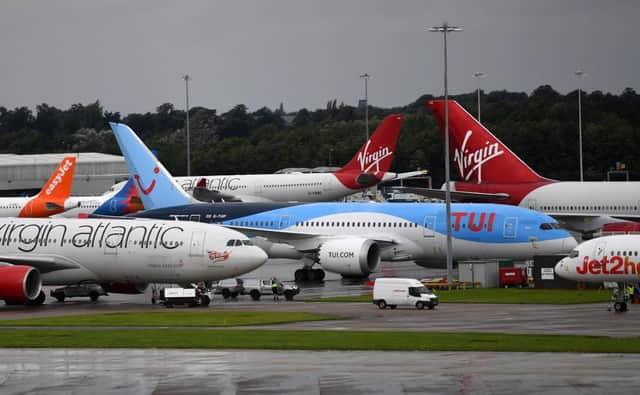More passengers to get payouts for delayed domestic flights under new plans


More airline passengers will receive compensation for delayed domestic flights under new government plans.
Transport Secretary Grant Shapps is proposing to make travellers eligible for payouts for flights within the UK which arrive at their destination more than one hour late.
Advertisement
Advertisement
The UK currently follows the European Union’s EU261 rule which means that passengers on flights shorter than 11,500km (932 miles) can claim £220 for delays of more than three hours, but cannot claim anything for shorter hold-ups.
The government is now considering scrapping the system in favour of a model similar to one used by rail and ferry operators, which links compensation to the cost of travel.
How much compensation will passengers get?
Under the Department of Transport’s (DfT) plan, which is under consultation, passengers would be entitled to the following compensation in the event of a delayed domestic flight:
- 25% of the ticket price for delays of more than one hour but less than two hours- 50% of the ticket price for delays of more than two hours but less than three hours- 100% of the ticket price for a delay of more than three hours
Advertisement
Advertisement
The DfT did not specify which categories delays of exactly two and three hours would fall into.
Airlines avoid paying compensation for disruption caused by events outside their control, such as extreme weather, security alerts and restricted air traffic control operations.
What other changes could be made?
The government is considering making it mandatory for airlines operating in the UK to sign up to an alternative dispute resolution (ADR) scheme, which could help more people receive the refunds and compensation they are entitled to.
ADR programmes have helped thousands of passengers escalate complaints without going to court, but membership by carriers is voluntary.
Advertisement
Advertisement
Other plans include giving the Civil Aviation Authority (CAA) more power to enforce consumer laws through the ability to directly fine airlines for breaches.
Mr Shapps is also proposing to require airlines to pay the full cost of repairing or replacing wheelchairs and mobility scooters that are lost or damaged during domestic flights.Airlines are currently only obligated to pay passengers up to around £1,200 for damage to or loss of their belongings under the terms of the Montreal Convention, even though some wheelchairs cost more than £25,000.
Mr Shapps said: “People deserve a service that puts passengers first when things go wrong, so today I’ve launched proposals which aim to bolster airline consumer protections and rights.
“We’re making the most of our Brexit dividend with our new freedoms outside of the EU, and this review will help build a trustworthy, reputable sector.”
Advertisement
Advertisement
CAA chief executive Richard Moriarty said the plans are a “clear indication of the need to enhance our enforcement powers, and bring us in line with other regulators”.
Rocio Concha, director of policy and advocacy at consumer group Which? added that trust in travel firms “plummeted” when the Covid-19 pandemic began as some airlines “ignored their legal obligations and refused to pay refunds for cancelled flights”.
She said the consultation is “a welcome step” to improving consumer rights and protections.
Ms Concha explained: “This consultation is a welcome first step that must improve and strengthen consumer rights and protections so that complaints are dealt with fairly and promptly, and that passengers receive the money they are due quickly and without unnecessary hassle.
“It is also vital that the system is backed up by a regulator with the powers it needs to take swift and strong action against any company that breaks consumer law.”